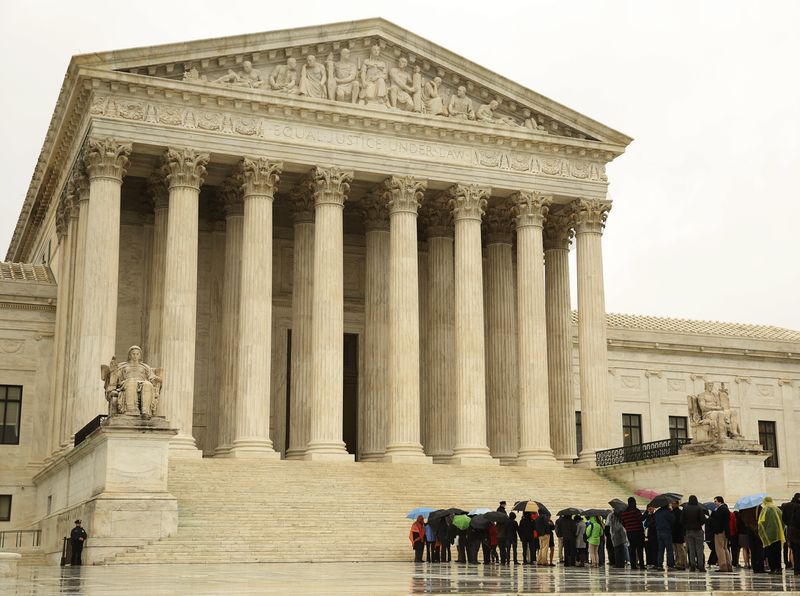By John Kruzel
WASHINGTON (Reuters) - The U.S. Supreme Court on Monday kicks off a new nine-month term featuring major cases ranging from the right of domestic abusers to have guns to the fate of the federal consumer finance watchdog agency, giving its muscular conservative majority fresh opportunities to reshape American law.
Its docket features tests of the authority of U.S. agencies including an effort to effectively dismantle the Consumer Financial Protection Bureau (CFPB) and limit the in-house enforcement proceedings of the Securities and Exchange Commission (SEC), the financial markets regulator.
The gun rights, CFPB and SEC cases are among the appeals by Democratic President Joe Biden's administration that the justices will hear involving rulings by the New Orleans-based 5th U.S. Circuit Court of Appeals, whose staunch conservatism rivals that of the Supreme Court. The administration also has asked the court to reverse a 5th Circuit ruling limiting access to the abortion pill mifepristone, though the justices have not yet announced whether they will hear the case.
By tradition, the court opens its annual term on the first Monday of October. It has had a 6-3 conservative majority since Amy Coney Barrett, the last of Republican former President Donald Trump's trio of appointees, joined in late October 2020.
Since then, it has ended its recognition of a constitutional right to abortion, rejected race-conscious college student admissions, expanded gun and religious rights and allowed an exemption to anti-discrimination laws protecting LGBT people and others.
"This is the court conservatives have wanted for decades - and it is not disappointing them," said Erwin Chemerinsky, dean of the University of California Berkeley Law School.
Chemerinsky said his question heading into the term is: "Will the court continue to push the law so far to the right so fast?"
Roman Martinez, a former law clerk for conservative Chief Justice John Roberts who often argues cases at the court, said the court has hewed to a "textualist and originalist approach" that seeks to interpret the U.S. Constitution and statutes as written "in accordance with their original meaning."
THE 5TH CIRCUIT
The justices on Nov. 7 are set to hear the administration's appeal defending a 1994 federal law that bars people under domestic violence restraining orders from possessing firearms. The 5th Circuit ruled that the law violates the U.S. Constitution's Second Amendment "right to keep and bear arms."
U.S. conservatives long have sought to dismantle what they criticize as the "administrative state," the federal bureaucracy whose technical expertise is distilled into a panoply of rules and regulations affecting businesses and individuals. The conservative justices have given succor to this effort and will get a chance to do so again in at least three cases including the CFPB one to be argued next Tuesday.
For decades, when courts were asked to review whether an agency's action was authorized by Congress, judges tended to defer to the agency's interpretation of the relevant law, as guided by Supreme Court precedent.
But the court in recent years increasingly has demanded that agency actions - especially those of political and economic consequence - be clearly authorized by Congress. It has applied this exacting standard - called the major questions doctrine - to pare back the Environmental Protection Agency's ability to combat climate change and the Education Department's authority to forgive student debt.
"I expect the court will continue to look skeptically at ways in which administrative agencies are operating in tension with the separation of powers envisioned by the Constitution," said Martinez, referring to the authority divided among the U.S. government's executive, legislative and judicial branches.
University of Illinois Chicago law professor Steve Schwinn characterized the court's hostility to the "administrative state" as "a major power grab at the expense of Congress and the executive branch," and warned of pernicious effects.
"As a society, we are unlikely to appreciate the full effects of these court rulings until long after the court has done its business - a little like the frog in the boiling water," Schwinn said. "This is a major problem, and it's anti-democratic."
The justices this term could hear five or more appeals of 5th Circuit rulings. In addition to the abortion pill case, they also are considering taking up an appeal by industry groups that challenged a 5th Circuit ruling upholding a Republican-backed Texas law that limits the ability of social media companies to curb content that these platforms deem objectionable.

The cases test whether the Supreme Court will go as far as the 5th Circuit.
"My instinct is that the Supreme Court will not go this far in most of these cases," Chemerinsky said. "I think the 5th Circuit has taken positions that the most conservative justices will accept, but I would be surprised to see a majority for these positions."